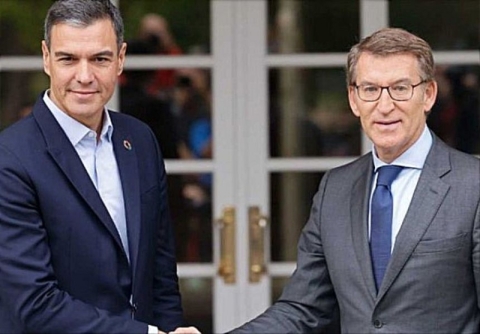Politics
Resignation, confidence or elections: difficult choice of Spanish Pedro Sánchez
Reflect on their future
USPA NEWS -
Only twice in the 49 years of recent democratic history in Spain has a Prime Minister resigned. It was in 1981, when the then President of the Government, Adolfo Suárez, resigned to continue in office, being replaced by Leopoldo Calvo Sotelo. An attempted coup d'état during Calvo Sotelo's investiture session put an end to the Transition from dictatorship to democracy, but the new Prime Minister would lead the Government for less than two years. He resigned in December 1982.
Therefore, Spain has no experience in the resignation of its presidents. And yet, resignation is one of the three possibilities that open up after the announcement of the current Prime Minister, the socialist Pedro Sánchez, who on Wednesday, in an open letter to the Spanish people, spread on social networks, stated that he was reflecting on his continuity at the head of the Government. His ministers pointed out, shortly after, that Sánchez's morale is low, that he is discouraged. And they blamed the conservative opposition and the extreme right for leading him to a painful decision.
Because the President of the Spanish Government has three options: resign; submit to a vote of confidence in Parliament, and call legislative elections. For this last possibility he should wait until May 29 because the Spanish Constitution establishes that elections cannot be called until one year after the previous appointment with the polls. It is the option recommended to him by the conservative opposition, which accuses Sánchez of selling Spain to the independentists and reproaches him for posing as a victim of his political enemies.
Precisely an independentist, the former regional president of Catalonia Carles Puigdemont, who is on the run from Spanish Justice, believes that Sánchez should submit to a vote of confidence. The Catalan independentists, benefited by the Amnesty Law, would support Pedro Sánchez because with him as President of the Government the pardon would eventually arrive and Catalonia would receive more powers.
The third possibility is that Sánchez resigns next Monday. His threat comes when a Madrid Court has begun to investigate his wife for alleged influence peddling. The judge believes that there are indications to investigate the complaint filed by the Manos Limpias (Clean Hands) association. Shortly after, said association admitted the possibility that its reporting sources provided it with false data. After hearing about the judicial investigation, the Prime Minister assured that he continues to believe in Justice and asked that the judge in charge of the case be allowed to work.
While Sánchez is plucking the daisy of his immediate future, his letter to the Spaniards was the topic of conversation this Thursday in the gatherings on all television stations, in the newspapers and in the bars. Whatever his decision, he leads Spain into an almost unprecedented situation. Those who point out that he will resign from office because he aspires to preside over the European Council forget that Sánchez called the head of the conservatives in the European Parliament, the German Manfred Weber, a “Nazi”, and that is considered a serious offense that closes the door to the European institutions to whoever commits it.
Liability for this article lies with the author, who also holds the copyright. Editorial content from USPA may be quoted on other websites as long as the quote comprises no more than 5% of the entire text, is marked as such and the source is named (via hyperlink).






